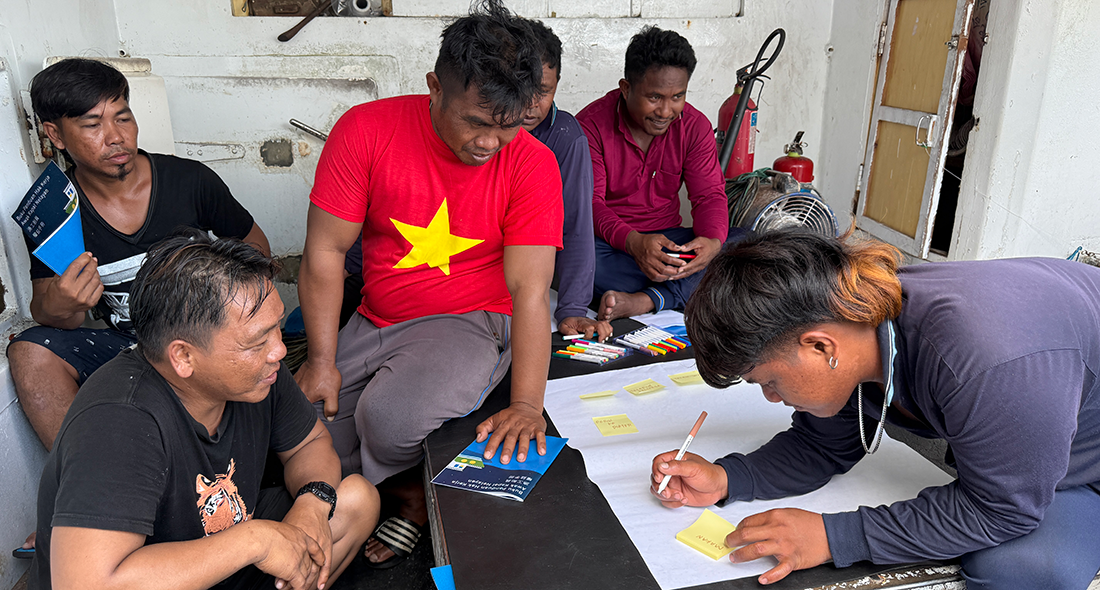Services
We help forward-thinking companies, investors, NGOs, seafood harvesters and others deliver on their sustainable seafood and fisheries improvement goals.
Working in fisheries improvement or sustainable seafood? We can help you deliver on your goals.
Our ever-expanding portfolio of environmental, social and economic fisheries sustainability work spans the globe. We collaborate across geographies and stakeholder groups to improve fisheries and seafood systems. Our work includes designing and managing projects and initiatives that advance social responsibility, support policy reform, improve fishing practices, and strengthen supply chain sustainability. From improving market access to crew-level protections, our approach integrates ecosystem health, community well-being, and economic viability—delivering meaningful and durable results.
.png)
Engage & Assess
Our work begins with science, objectivity, and a clear understanding of each fishery’s unique needs. We use rigorous, evidence-based methods—paired with direct engagement with workers, communities, and stakeholders—to assess real-world risks and opportunities.
As a trusted technical partner, we apply the right tools to generate insight, guide action, and shape practical solutions that can endure over time. Services we provide here include:
- Social, Financial & Environmental Assessments: Identify risks, challenges, and opportunities across labor conditions, human rights, ecosystem health, and fishery performance.
- Fisheries Management & Policy Analysis: Evaluate governance and regulatory frameworks, support evidence-based reform, and connect policy goals to practical realities.
- Systems Mapping & Supply Chain Insight: Map interconnected systems—including product flow, traceability, and leverage points for improvement across the value chain.
Our services in action:

Co-Design & Implement
Our approach starts with co-design—working with stakeholders to shape strategies that reflect both local realities and shared priorities. Because environmental and social outcomes are deeply connected, we aim to integrate both dimensions wherever it strengthens project goals.
Through collaboration, we ensure that solutions are relevant, responsive, and grounded in the lived context of each fishery. Services we provide here include:
- Strategic Advisory & Consulting: Provide guidance on policy alignment, human rights due diligence, and responsible sourcing—helping partners shape strategies that are credible, inclusive, and grounded in local realities.
- Co-design Fishery Improvement Pathways: Work with fishery stakeholders to identify pathways toward achieving internationally recognized environmental and social standards— through collaborative planning and technical guidance.
- Implementation & Achievement: Strengthen fishery performance with science-based tools that rebuild stocks, protect habitats, and reduce ecosystem impacts—while improving labor rights, working conditions, and equity through people-centered solutions, and expanding market access and income opportunities that support the long-term viability of fishing communities.
Our services in action:

Build & Transform
We believe that lasting change is built on trust. Our approach emphasizes respectful collaboration and cultural awareness, with a focus on supporting local leadership wherever possible.
Through stakeholder facilitation, training, and technical support, we help create the conditions for ownership, capacity, and continuity—long after our direct role ends. Services we provide here include:
- Stakeholder Engagement & Facilitation: Foster inclusive dialogue and shared implementation through trusted, context-aware facilitation.
- Capacity Building & Training: Equip partners with tools, knowledge, and leadership capacity to carry forward change.
- Improvement Validation & Certification Support: Help fisheries demonstrate progress through credible improvement tracking, verification, and alignment with global standards.
Our services in action: